|
Field Marshal Lord Guthrie of Craigiebank GCB GCVO OBE DL
Late Welsh Guards and The Colonel of The Life Guards
by Paul de Zulueta
formerly Welsh Guards
|
Field Marshal Lord Guthrie took great pride in being a Guardsman, and it is as a Guardsman, the first Foot Guards field marshal since Sir Harold Alexander in 1944, that he will be remembered. Charles would always point to his time serving with the Household Division, and the officers and men with whom he served, as among the most formative periods of his remarkable military career.
As a pupil at Harrow, where he became Head Boy and Captain of the First XV, Charles wanted to join the Royal Navy. He was an avid reader of CS Forester’s Hornblower books and he entertained the idea that a naval career would satisfy his thirst for adventure and travel. A visit to a frigate in Portsmouth, where he spent most of the time below the waterline with the chief engineer explaining how everything worked, put paid to any visions of the spirit of Nelson and Trafalgar. It was our and the Army’s good fortune that Charles had a cousin, Desmond Llewelyn, later of ‘Q’ fame in the early Bond films, who arranged an interview with the Regiment. Two Welsh Guards officers took Charles to lunch at the then Guards Club in Mayfair. It was a bibulous affair and Charles arrived back at Harrow three sheets to the wind. He was pleased, however, to receive a letter two days later from the Regimental Lieutenant Colonel saying the Regiment would be delighted to accept him as an officer.
Charles joined the 1st Battalion in 1959 and was fortunate to serve under some fine officers, many of whom had served with courage and distinction in the Second World War. John Miller, who had won the DSO and MC during the Normandy Campaign, later to become The Crown Equerry, was his first Commanding Officer. He taught Charles, born from his wartime experience, the importance of what was, and what was not, important as a leader, and that the officer who insisted that everyone had to be busy all the time was doomed to fail. Charles took this lesson to heart knowing that sport, travel and adventurous training played as important a role in a Guardsman’s life as learning how to shoot straight.
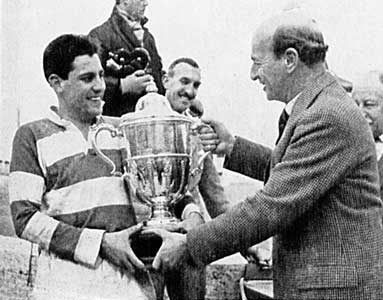 |
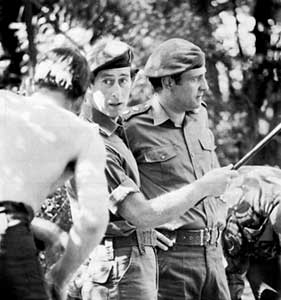 |
| Army Rugby Final, Berlin, 8th April 1964. Major General David Peel-Yates presenting the Army Rugby Cup to the Captain of the Welsh Guards team, Lieutenant Charles Guthrie, on the third consecutive year that the Welsh Guards had won the competition |
The Prince of Wales (now The King), Colonel of The Welsh Guards, with Lieutenant Colonel Charles Guthrie, Commanding Officer, 1st Battalion Welsh Guards, on exercise in Berlin. 1978 |
In 1965, Charles was appointed as adjutant to Philip Ward as the Battalion deployed to Aden. Philip was a commanding officer, later to become the first Welsh Guards Major General Commanding the Household Division, whose gifts and qualities far transcended those of most officers. It was Philip’s view that how you treated and dealt with people, whatever their position or rank, was what mattered, and that time spent observing and reading people would always pay dividends. Charles, throughout his career, was always supremely courteous to those he served with, never given to histrionics, or raising his voice and relying on a stony look to show his displeasure. Christopher James, a platoon commander in Aden, later to serve with the SAS, remarked that Charles was ‘absolutely terrifying as adjutant, a mere look and we, as subalterns, would soon be scuttling behind the nearest sangar’.
Charles’s time in Aden gave him a taste for soldiering at the sharp end. He had seen the SAS operating in the Radfan and, as he wrote in his memoirs, Peace, War and Whitehall, ‘I felt there was something missing, an itch that had to be scratched before it was too late and that the time I would serve at a desk would outweigh the time leading soldiers’. In the 1960s, the SAS as a career was not commonplace. Many saw it as a hinterland for hotheads and mess mavericks rather than the steady path to high command that it is today. Charles had no regrets about his decision to try for SAS selection and was fortunate, after he passed the rigorous selection process, to serve with two remarkable Scots Guards officers, the granite tough Murray de Klee who passed selection in his late 30s, and Alastair Morrison who was to win the MC at the hostage rescue at Mogadishu in 1977. Charles served in Aden, Kenya and Malaya where he found himself chasing the communist leader of the Malayan National Liberation Army, the wily Chin Peng. With characteristic modesty, Charles remarked of his time with the SAS, ‘Only when you learn to manage yourself, can you lead and manage others’. A Household Division officer who was to reach four-star rank, put it differently: ‘It was here that Charles developed his acute sense of intuition, a combination of experience and intelligence that allowed him to decide quickly whether a plan would or would not work’.
Time in the SAS did not lend itself to studying for the Staff College exam and Charles failed the exam on his first attempt. He returned to the Regiment in the British Army of the Rhine (BAOR) and was given command of The Prince of Wales Company (The Prince of Wales’s since 1981) in Münster as part of 4th Guards Armoured Brigade. The far-sighted brigade commander, Brigadier Sir Ian Jardine Bt, a Coldstreamer, and Charles’s Commanding Officer, James Malcolm, gave Charles as much time off a possible to study for the exam which Charles passed on his second attempt.
BAOR was a carefree existence in those days, the highlight of the ‘Season’ was the Rhine Army Show, but The Troubles in Northern Ireland (NI) were soon to cast a dark shadow over the Army’s core being. In March 1971, the Battalion deployed to North Belfast as part of 39 Brigade with The Prince of Wales Company billeted at Carmoney Factory. The tour was relatively quiet, largely an exercise in riot control. This changed radically after the Government introduced internment without trial later that year and the Bloody Sunday massacre by the Parachute Regiment in January 1972. British Army and civilian casualties increased tenfold in just a year.
But the tour did hold some blessings for Charles. First, it convinced him that he did not want to return to the SAS, and that his heart was now set on commanding the Welsh Guards, their hywl and indomitable sense of humour saw to that alone. Second, and more importantly, he knew he wanted to spend the rest of his life with Kate Worrall, the eldest daughter of Colonel Claude Worrall, Coldstream Guards. Claude Worrall’s two younger daughters, Sue and Miranda, also married Welsh Guards officers: Sue to David Lewis, who was our Regimental Lieutenant Colonel, and Miranda to Christopher Drewry who was Charles’s adjutant in Berlin and went on to become Lieutenant General Sir Christopher Drewry, the first Household Division officer to command the Allied Rapid Reaction Corps. Charles and Kate married in September 1971 and celebrated their golden wedding anniversary in 2021. As Charles wrote in his memoirs, ‘someone once said that behind every successful man is a woman. Kate was beside me, often in front of me, but never behind me’. During his army career, Kate and Charles moved house 23 times.
Charles now had the hard-won experience to make a success of his time at the Staff College. On the social side, he captained the Staff College rugby team having amended the fixture list so that they were unbeaten. This played into the hands of the Commandant, Patrick Howard-Dobson, who was a rugby fanatic. Charles also had the knack of keeping quiet during syndicate discussions until the end when he would succinctly summarise his fellow students’ viewpoints before setting out a clear path forward. Charles’s acumen paid off and he was made Military Assistant 2 to the Chief of the General Staff (CGS).
Success in such a demanding job, working for a ferocious CGS, Michael Carver, whose exacting intellect and war record (he was one of Monty’s brigadiers aged 29) would ensure Charles’s trajectory was poised for the Army’s highest reaches. At times, it was unsettling: ‘Guthrie, I’m off for lunch but I’d like next year’s financial projections for BAOR by 3pm’. Charles, however, learnt how the Army and the MOD worked, fostered relationships with key civil servants and those officers who were likely to be the Army’s future. He was made a Lieutenant Colonel at the age of 37.
Charles was appointed Brigade Major, serving under Philip Ward and the redoubtable John Swinton, during a tour which included The Queen’s Silver Jubilee in the summer of 1977. Charles was later to remark that he had never been busier in his entire army career. John Swinton graded Charles ‘outstanding’ in his confidential report to which the senior reporting officer, a Green Jacket Commander-in-Chief UKLF, took umbrage saying, ‘I do not believe a staff officer in London District should ever warrant a grade of outstanding. John swotted him away with, ‘I am afraid I have already discussed the report with Her Majesty and she has agreed the grading’.
Charles took command of the Battalion in Berlin in 1977. It was the happiest period of his life, and one of the most memorable periods in the Regiment’s history. Berlin had a sharpness to it socially and militarily. If he felt the social side was in the ascendant, he would deploy the Battalion at short notice on an exercise in the Grunewald, or a river crossing across the Havel. He only missed his timing once when the brigade commander, a dour lowland Scot, challenged Charles about the amount of time his young officers spent in ‘clubs’ in the French Sector. Charles replied, ‘Only on sports afternoons, Brigadier’. This was met with an arctic smile.
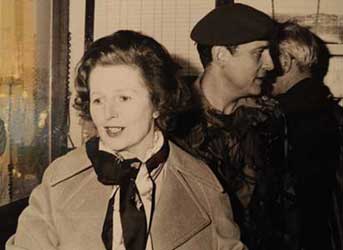 |
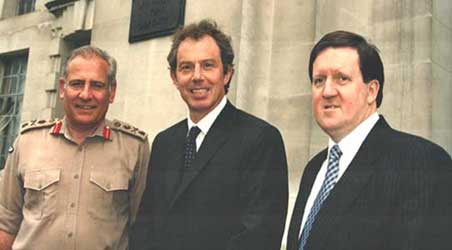 |
The Prime Minister, Margaret Thatcher, with the Commanding Officer, Northern Ireland. 1979
|
During Charles Guthrie’s tour as Chief of the Defence Staff, with Tony Blair, the Prime Minister, and George Robertson, Secretary of State for Defence, both described by him as 'decisive and supportive’. 1998 |
Towards the end of Berlin, Charles was warned off for an operational tour to South Armagh, ‘Bandit Country’ in NI over the winter of 1979/80. The backdrop to the tour was alarming. The Army was on the back foot. The loss of 18 soldiers and twenty others seriously wounded at Warrenpoint on 27th August 1979, and the murder of Lord Mountbatten and members of his family on the same day had made both the Army and politicians edgy.
There was a widespread feeling in some parts of the Army that the purpose of a NI tour was to keep a clean slate. Charles, however, was determined to take the fight to the terrorists, despite the loss of Guardsman Paul Fryer at the tour’s beginning from an IED. He had chosen his officers and senior non-commissioned officers carefully and would back them to the hilt even when, on one occasion, the close observation platoon commander set up an observation post on the Republican side of the border. With SAS support, he planned and executed a battalion operation which made the ruthless IRA South Armagh Active Service Unit (ASU) sit up and recognise they were up against a formidable foe. There were no more casualties.
When Charles left the Battalion at the tour’s end, he went round every outpost in South Armagh to bid farewell to Guardsman and officer alike. He was visibly moved, knowing that his days wearing a Welsh Guards cap badge were over. The Battalion for its part took pride in the fact that, under his leadership, it had become one of the best battalions in the British Army.
Many senior officers were nonplussed when they saw Charles wearing a day-glow yellow ribbon on his uniform in 1981. There were mutterings as to its provenance. It was in fact The Queen’s Certificate and Badge of Honour (an award from Queen Victoria’s reign) for Charles’s role in what became known as the Coconut War. Charles from 1980-82 was Colonel Military Operations responsible for operations outside the UK and Europe. The Coconut War was a hangover from our days of Empire, in the New Hebrides (Vanuatu today) which was smouldering with unrest as it approached its Independence Day in July 1980. The French had a claim, or so they said, and diplomacy with a firm hand was the only answer to the rebels who wanted to run the place along tribal lines. Charles with the wonderful Gilbert and Sullivan title of ‘Commander South Pacific’ got the French on side as well as the New Hebridean people with a little help from 42 Commando. It was Charles at his most politically astute: diplomatic, intuitive and cool-headed in what might have become an unpleasant aftermath to a throwback from the Empire.
Just over twenty years since he had served in Münster, Charles returned as Commander 4th Armoured Brigade (they had dropped the 4th Guards Armoured Brigade in 1982). Charles was delighted to have the Irish Guards under his command, led by Robert Corbett, later to be the Major General 1991-94. Robert was a man after Charles’s heart, the last commander of the Guards Parachute Company and an officer determined to see the ‘Micks’ at the forefront of the changes sweeping through BAOR. The architect of these changes was the formidable Corps Commander, Nigel Bagnall. He devised a new operational doctrine, the Counter Stroke, which was not to defend NATO on its borders but to allow the Russian Third Shock Army to run its course and then be caught on the hop by aggressive armoured thrusts from the flanks. 4 Brigade was at the centre of this initiative. Charles, supported by some very able squadron and company commanders in his brigade, six of whom were later to become generals, helped Bagnall to make it as workable and imaginative a plan as possible.
It was now clear to the Army Board that Charles had the experience and acumen to run the Army and that he should be given jobs to ensure he was as accomplished as possible to embody the Army’s core values of trust, courage and integrity. As Chief of Staff for 1st British Corps, 1984-86, it was his job to ensure that Bagnall’s successor, Martin Farndale, kept a steady hand on the tiller and that the renewed sense of vigour and fighting spirit in BAOR was not lost. Many Guardsmen who served in Germany in 1984 will remember Exercise LIONHEART, a NATO exercise of 130,000 personnel to test our readiness against the Warsaw Pact. His subsequent appointments as GOC 2nd Infantry Division and Corps Commander were the pinnacle of his soldiering and operational career.
What followed required a very different set of attributes. On his appointment as Commander-in-Chief BAOR and the Northern Army Group, Charles at a stroke became a diplomat first, a soldier second, and with his thinking shaped as much by geopolitical and strategic considerations as the challenges facing the British Army. Options for Change, the so-called ‘Peace Dividend’ had left the Army in a vacuum with BAOR reduced from four divisions to one. He had to keep the Army motivated and trained and the politicians aware that the peace dividend was not an excuse to let the nation’s guard down. As Harold Macmillan once famously said, ‘Events, dear boy, events’, and with the invasion of Kuwait by Saddam Hussein, and the collapse of Yugoslavia into internecine warfare, the Army never found itself busier.
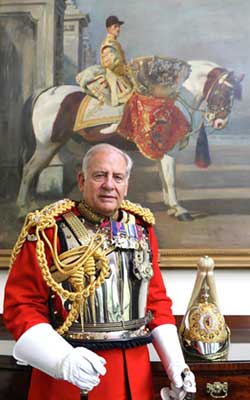 |
| Colonel The Life Guards. Henry Dallal |
Charles became CGS in 1994, a position to which he brought his flair for managing and getting on with all the people that mattered in the MOD, Westminster, and the wider services. One of his great strengths was his ability to delegate. On his first meeting with his ACGS, a small but bouncy Gunner, he said, ‘look, the Army’s your train set, get on with it, you know my priorities, don’t bother me unless a train is coming off the tracks. I’ll look after Westminster’. Despite his time as MA to Carver, Charles was not a general who believed in detailed papers for politicians to consider. He would take them to lunch at White’s, a discreet table in the corner, where they would thrash out what needed to be done. He would also take journalists, whatever their political hue, to lunch or breakfast at the Savoy so they had a better sense of the Army’s role in society and defence and the challenges it faced.
Charles faced criticism from those who felt he was too close to Tony Blair when he became Prime Minister in 1997 and Charles was appointed Chief of the Defence Staff (CDS). Charles saw things differently. If he was to be seen and heard as CDS he had to have good working relationships with ministers and the Prime Minister. Blair and Charles quickly built-up trust and when, for example, British soldiers had been kidnapped in Sierra Leone in 2000, Charles explained how the SAS would rescue the soldiers from a brutal end, Blair said, ‘OK, let’s do it’. He was also respected by and had the ability to get on with those important people around Blair. Alistair Campbell, Tony Blair’s director of communications in Downing Street, described him as ‘an amazing guy’, and remembers one of his proudest moments was when Charles asked him to speak to a group of ‘top-brass’, introducing him as the ‘SAS of spin’.
Charles became Colonel of The Life Guards in January 1999, an appointment he regarded as a singular honour. He chaired The Life Guards Regimental Council with wisdom and was delighted that their role as an armoured reconnaissance regiment aligned to the Airborne and Commando Brigades proved to be a great success. He also took great pride in the quality of officers it recruited, many of whom served with distinction in the Special Forces and the higher reaches of the Army. His greatest pleasure was the regimental dinners where, in his wonderful conspiratorial way, he would regale those present with anecdotes from his long military career. When he retired as Colonel in 2022, he remained ‘Colonel Charles’ to everyone. He may have been a Welsh Guardsman at his core but as Colonel of The Life Guards, he took the Regiment to his heart.
Charles’s legacy to both Regiments and the Army was wide-ranging, but there is one personal legacy that stands out: 13 officers who served with Charles went on to become generals. They learnt from his example, a mark of true leadership.
Charles’s retirement was at full throttle. He had built up an extraordinary network of friends from every walk of life from all round the globe who sought his advice. He was made chairman of Rothschild Latin America as well as numerous other non-executive directorships. He never forgot his charitable work and also became Chancellor of Liverpool Hope University.
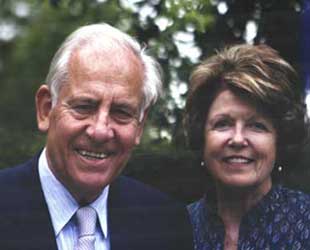 |
Charles and Kate Guthrie, enjoying a happy
retirement,
after … 23 moves. 2014 |
One newspaper obituarist wrote that ‘one honour eluded him: the Garter’, and that speculation persists that The Queen considered Guthrie ‘too high with the Catholics’. This does not bear scrutiny.
When Kate died in September 2022, Charles was bereft. They had walked side by side for 51 years. After his fall at Trooping the Colour in 2018, Charles did become frailer and his memory less sound although his anecdotes were as lively as ever. His strong Catholic faith, which he practised in a very private way, sustained him during his last years. He was beautifully looked after by his carers and two sons, David and Andrew, but was happy to fade away as old soldiers do on 18th September, aged 86.
Charles Guthrie was ADC General to Queen Elizabeth II from 1993 to 2001, Colonel Commandant Intelligence Corps from 1986 to 1995, Colonel Commandant SAS Regiment from 2000 to 2009, a Knight of Malta, and a Freeman of the City of London. A full military funeral took place on 15th October in Westminster Cathedral, attended by The Duke of Kent. The King was represented by General Sir Roland Walker, and The Queen was represented by Lieutenant General Sir James Bucknall. The Celebrant for the Requiem Mass was Cardinal Vincent Nicholls, Archbishop of Westminster, and there was a large congregation of family, friends, and former colleagues. As the coffin was borne from Westminster Cathedral, The King's Troop Royal Horse Artillery fired a 19-gun salute at the Royal Hospital Chelsea.
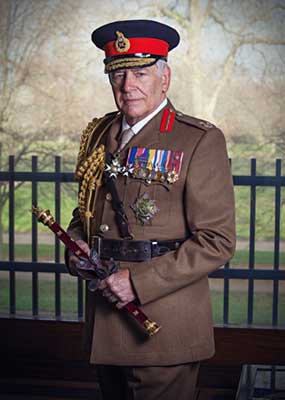 |
Field Marshal Lord Guthrie of Craigiebank
Aliona Adrianova |
|
|







